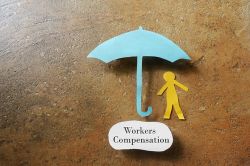Construction Accidents & New Jersey’s Workers’ Compensation System
August 1, 2019

Construction Accidents
Because of the nature of the work involved, construction workers may sustain one or more work-related injury at some point in their careers. On any given day, construction workers may fall from scaffolding, get hit by falling debris, get injured by machinery or tools they use, or may be electrocuted by live wires on-site. Depending on the severity of the injuries they sustain because of a construction accident, constructions workers may need to take time off of work to recover from their injuries, work with certain restrictions placed on them for a short period of time, or, in extreme cases, may be injured to a point where they can never perform the job duties they once did. When construction accidents happen in New Jersey and construction workers are injured, New Jersey’s workers’ compensation system allows injured construction workers to receive monetary payments to sustain themselves and their dependent families while they recover from their injuries.
In this blog, we discuss how New Jersey’s workers’ compensation system works and what injured construction workers need to do in order to receive workers’ compensation benefits in New Jersey.
New Jersey’s Workers’ Compensation System Explained
New Jersey’s workers’ compensation system was created by the New Jersey workers’ compensation law in 1911 as a means to provide workers injured on the job with monetary benefits to cover the costs of living and medical care while the worker recovers from the injury. This law also allows families of workers killed on the job to recover monetary benefits, on at least temporary basis, to account for the loss of income they experience as a result of their loved one dying due to sustaining work-related injuries.
According to the New Jersey Workers’ Compensation law, all New Jersey employers must have a workers’ compensation insurance policy or, if the employer is large enough, must qualify to be self-insured. When workers suffer work-related injuries or workers are killed while performing their job duties, the injured worker, or the deceased worker’s family, may receive workers’ compensation benefits by filing a claim with their employer’s workers’ compensation insurance carrier or, if their employer is self-insured, with their employer itself. The claim is then investigated by the employer’s workers’ compensation insurance carrier or the employer itself if it is self-insured. After the investigation, the carrier or employer will decide whether or not to approve or reject the claim. If a claim is approved, depending on the nature and severity of the work-related injury, the claimant will receive the one or more of the following types of benefits:
- Payment for lost wages – This benefit is generally awarded to injured workers who cannot return to work because of their injuries seven days after the injury occurred. If you receive this benefit, you are entitled to receive up to 70% of your weekly gross wage unless that amount exceeds the maximum rate set each year by New Jersey’s Department of Labor and Workforce Development. In 2019, the maximum lost wages benefit one may receive is $921 per week
- Medical Treatment – In addition to payment for lost wages, injured workers may receive medical treatment for their injuries, the expenses of which are paid by their employers’ workers’ compensation carrier or the employer itself. However, it is important to note that New Jersey’s Workers’ Compensation law allows the employer to dictate the type of treatment the injured worker receives and who administers this treatment
- Death Benefits – If a worker dies due to a work-related injury, the workers’ dependents may receive payment in the form of death benefits. Death benefits include payment to account for the loss of income the workers’ dependents now experience, as well as payment of any medical or hospital expenses the worker incurred prior to death and payment of burial expenses. Like payment for lost wages, payment for 2019 cannot exceed $921 per week
The important thing to note about New Jersey’s workers’ compensation system is that it is a “no fault” system. This means that, even if the worker is responsible for his or her work-related injuries, the worker is still eligible to receive workers’ compensation benefits. It also means that, if the employer is responsible for the injuries, the worker, by accepting workers’ compensation benefits, releases the employer from any further legal liability for causing the injuries.
How Construction Workers Injured in Construction Accidents Obtain Workers’ Compensation Benefits in New Jersey
As we mentioned earlier, in order to receive workers’ compensation benefits, construction workers injured in construction accidents must file claims with their respective employers’ workers’ compensation insurance carrier, or with the employer itself if it is self-insured. Once a claim is filed, the insurance carrier or the employer will investigate the claim and determine whether it will approve and provide the injured construction worker benefits or it will reject the claim. If the claim is approved and the worker or family of the deceased worker is happy with the amount of benefits awarded, all the injured construction worker or the worker’s family must do is wait for the insurance carrier or employer to start making payments. Generally, injured workers and dependent family members in New Jersey can expect to start receiving workers’ compensation benefits within two to four weeks after the claim is approved. If, however, the injured construction worker or a deceased worker’s family is unhappy with the amount of benefits awarded or the claim is denied all together, the injured construction worker or deceased worker’s family may file an application for an informal hearing in front of New Jersey’s Division of Workers’ Compensation to review the disposition of the claim or file a formal petition with New Jersey’s Division of Workers’ Compensation. If this occurs, a workers’ compensation judge will review evidence you present and determine whether you are entitled to receive benefits and, if so, for how long and in what amount.
One thing that injured construction workers should be aware of when filing workers’ compensation claims is that all claims must be filed within two years of the date the injury occurred or, if challenging the amount of benefits you are entitled to receive, within two years of the date of the last payment you received. Otherwise, your claim may be considered waived and you will not be able to collect any further workers’ compensation benefits in New Jersey.
Contact a Morristown Workers’ Compensation Lawyer to Discuss Your New Jersey Workplace Injury Case
A workplace injury can be devastating, particularly if it prevents you from returning to work for an extended period of time. Although New Jersey workers’ compensation laws are supposed to provide you with reimbursement for medical expenses and replacement pay for missed time at work, it is not always easy to get the workers’ comp benefits you deserve. That is why you should speak with a knowledgeable workers’ compensation lawyer about your situation and get guidance throughout the claims process. The experienced workers’ compensation attorneys at Hoyt & Hoyt, P.C. represent clients in Morris Township, Dover, Rockaway, New Brunswick, and all across New Jersey. Call (973) 828-8187 or fill out our online contact form today to schedule a consultation about your work injury case. Our main office is located at 67 East Park Place, 5th Floor, Morristown, NJ 07960, and we also have an office located in New Brunswick, NJ.
The articles on this blog are for informative purposes only and are no substitute for legal advice or an attorney-client relationship. If you are seeking legal advice, please contact our law firm directly.





